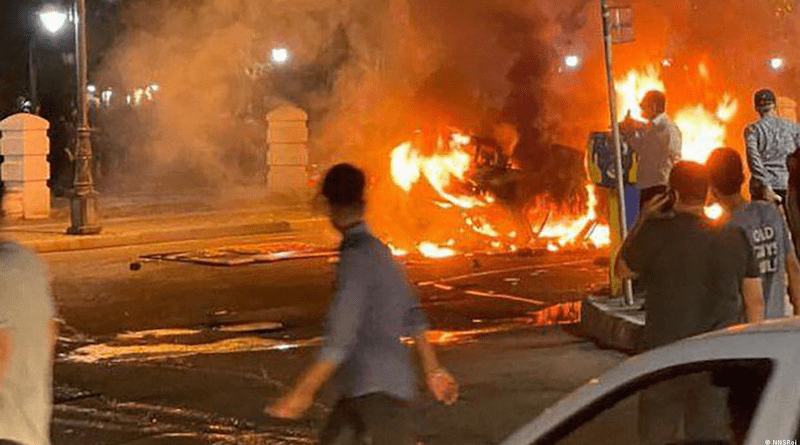Iran: Regime Fans Flames Of War In Middle East To Hide Its Domestic Weaknesses – OpEd
There is no doubt that Iran’s regime is playing an important role in the ongoing crisis in the Middle East. But what many analysts and politicians are still puzzled about is the motivation behind the regime fanning the flames of war in the region.
The regime’s primary objective is “to divert attention from the precarious internal state of the regime and the volatile conditions within Iranian society,” writes the National Council of Resistance of Iran (NCRI) in its latest comprehensive analysis of the regime’s regional strategy. The regime is trying in vain to contain an explosive society and prevent the expansion of the network of the Iranian Resistance.
“In this challenging context, the regime’s recurring strategy is to export crises abroad—a tactic employed consistently over more than four decades,” the NCRI writes.
But while the regime is trying to project power abroad, its officials are admitting that the social and economic conditions in Iran are exposing the regime’s weakness. And no amount of repression will provide the regime with reprieve from the situation.
On January 13, the Secretary-General of the Islamic Iran Nation Party Azar Mansouri warned about the implications of skyrocketing inflation and wage decreases, which is affecting all strata of the society except for the ruling elite. “If we cannot describe this situation as insecurity, what term would be fitting for this trend of diminishing the resources available to people?” Mansouri said. “Recent multifaceted protests, spanning from December 2017 to November 2019 and September 2022, have demonstrated an underlying accumulation of dissatisfaction and anger beneath the surface of society, emerging during opportune moments.”
In January 2023, the Secretary-General of the Kargozaran Party, Hossein Marashi that “over 75% of the Iranian population expresses dissatisfaction” with the regime. “We have a significant dissatisfied population, a portion of whom actively protest in the streets, and a small fraction might resort to causing disturbances,” he said.
In July 2023, the Jomhouri Eslami newspaper warned regime officials “of the day when the army of the hungry rises against you.”
The regime has a history of resorting to foreign wars and fictitious enemies to avoid solving the country’s problems and to suppress any form of protest or dissent.
However, today, the regime has a bigger problem, which is the expansion of the organized resistance movement, notably the growth of the Resistance Units, the Iran-based network of the regime’s main nemesis, the People’s Mojahedin Organization of Iran (PMOI/MEK).
On a state-organized radio show in August 2023, Mehdi Rouhani Far, introduced as an expert in political affairs and terrorism, described the PMOI as “one of the most significant factors” in protests, which he called “tensions.”
“Anyone with government responsibilities, resources, and authority must pay extremely close attention, and is necessary to consider two key aspects: 1) The threat posed by the organization is much greater than before and 2) Developing an analysis of the reincarnation and transformation of this organization is of utmost importance,” he said.
Other officials have also admitted that the PMOI and its network have become an important source of concern for the regime. On June 24, 2022, the Director of Human Rights Matters of the regime’s Judiciary, Kazem Gharibabadi, said, “There is no meeting with ambassadors of European countries or delegations of European countries in which we do not bring up the issue of the Hypocrites.”
The NCRI report lays out the regime’s inability to handle Iran’s critical situation, which has resulted in the escalation of poverty, unemployment, and corruption. At the same time, the regime’s brutal methods, including an alarming uptick in executions, especially political executions, have not managed to reduce the critical conditions of the regime.
“Despite calls for a change of course from every faction, their collective tenure at the helm of the country’s political and socio-economic affairs has fallen short of meaningful action, leaving Iranians disillusioned,” the NCRI writes. “Therefore, Iranians have long passed beyond the regime’s internal factions. Public statements, even those blaming the regime’s leadership to display free speech, offer no solace and cannot save the regime from the imminent burst of outrage.”
Viewing the regime’s warmongering policies in this light proves that Tehran is not a power broker but a weak regime that is trying hard to hide its own weaknesses.
“Due to misunderstandings or the influence of the regime’s deceptive campaigns, the international community has failed to comprehend the true motives behind the regime’s illicit regional activities,” the NCRI writes. “For lasting peace in the Middle East, it is crucial to recognize that Tehran does not need a mere policy change but rather a complete regime change.”

